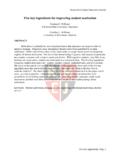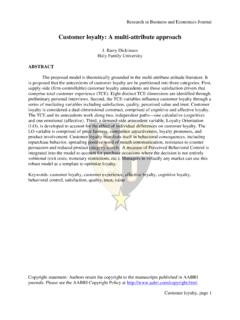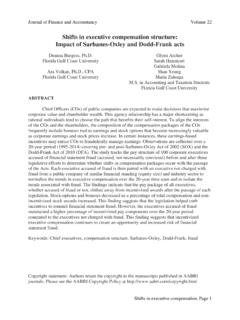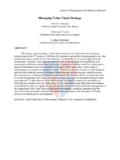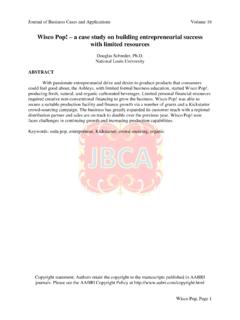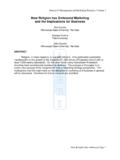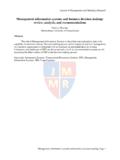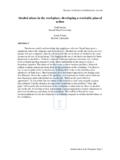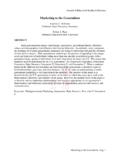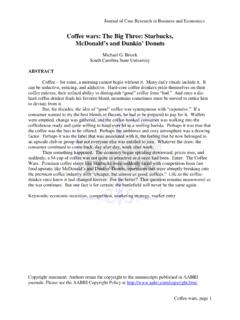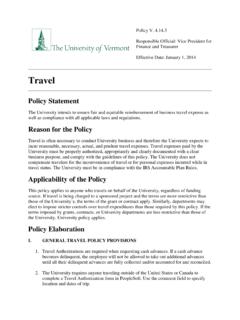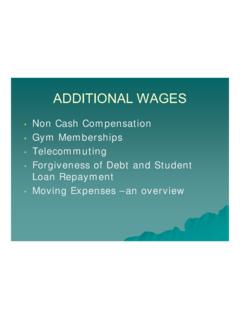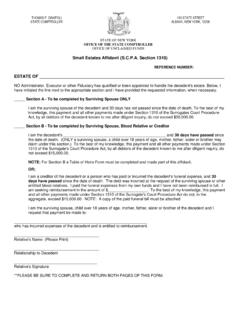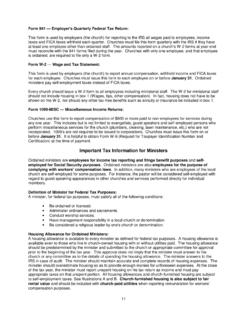Transcription of Tax and managerial implications of employer travel ...
1 Journal of Legal Issues and Cases in Business Tax and managerial implications of employer travel reimbursement policies Tanya M. Marcum Bradley University Sandra J. Perry Bradley University Jennifer Robin Bradley University ABSTRACT. Many employers encourage or require employees to travel as a condition of their continued employment. employers who reimburse employees for work-related travel expenses must have a policy that complies with current tax laws in order for those expenses to be deductible by the employer as a business expense. Some policies might seem to save the employer money by severely limiting reimbursable expenses or making the reimbursement process cumbersome for the individual employee. However, employer policies that are less restrictive and easy for employees to follow may increase employee productivity and commitment and avoid creating a stick it to the man attitude by those employees.
2 This paper examines the legal restrictions on employee travel expenses as well as employee perceptions of fairness and justice in the application of these policies and recommends policies that conform with the law as well as create increased employee productivity and satisfaction. Keywords: accountable plan, deductible business expense, distributive justice, managerial policies, organizational justice, procedural justice, reimbursement , travel expenses, travel reimbursement policies Copyright statement: Authors retain the copyright to the manuscripts published in AABRI. journals. Please see the AABRI Copyright Policy at Taxable and managerial , page 1. Journal of Legal Issues and Cases in Business travel CAN BE HARD A reimbursement POLICY SHOULDN'T BE. Employees are often expected to travel or make other expenditures as part of their employment responsibilities.
3 Some employers have policies to provide reimbursement to their employees who make such out-of-pocket expenditures on behalf of their employer 's trade or business. For employers that have reimbursement policies, there is an important trade-off between easy-to-administer employment policies and compliance with existing laws. employers must be compliant with exacting state and federal tax laws; employees want fair policies that are not unduly burdensome to follow. Management must also be aware of the morale and productivity concerns with the administration of various travel and expense policies. Ideally, the employer will have a travel policy that meets the federal income tax standard as an accountable plan. An accountable plan allows the employer to exclude amounts paid or reimbursed for employee travel and related expenses as reportable wages, thus avoiding payment of various taxes on those amounts.
4 Those amounts would not be treated as income to the employee and would not be subject to withholding. From a tax perspective, this is a win-win for both employer and employee. This article will examine the differences between travel reimbursement policies that meet the federal requirements for an accountable plan and those that do not, as well as the management implications involving employee morale, productivity, and satisfaction with policies that are perceived as fair and not unduly burdensome. UNDERSTANDING THE LEGAL REQUIREMENTS. Section 62 of the Internal Revenue Code [Code] provides that an individual is taxed on his or her adjusted gross income. An individual's adjusted gross income is all of his or her gross taxable income less any allowable deductions. Section 62 provides that an individual may deduct from his or her gross income reimbursements paid by the individual's employer for expenses incurred on behalf of the employer 's business if the expense is related to a reimbursement or other expense allowance arrangement made with the employer .
5 (Code . 62(a)(2)(A)). Any personal expenses of an individual are generally not deductible (Code . 262(a)). An expense must be ordinary and necessary in order to be an allowable deduction (Treas. Reg. (f)(2)). What is actually considered ordinary and necessary is determined on an industry by industry standard (Bittker, McMahon, & Zelenak 2002). One type of ordinary and necessary business expense is the expense for travel . This travel expense category should not be confused with daily commuting expenses of the employee that are not deductible. The travel expense includes those expenses incurred while traveling away from home on behalf of a trade or business such as meals, lodging, and transportation (Code 162(a)). The High Cost of Unreimbursed Employee Business Expense Deductions If an unreimbursed travel expense is incurred by an employee related to his or her employer 's business, an out-of-pocket payment of this expense by the employee carries with it a financial burden.
6 The employee who expends money on behalf of the employer 's business must carry this expense for the entire year, ultimately deducting the expense on that year's federal income tax return. With proper documentation, a taxpayer can deduct unreimbursed Taxable and managerial , page 2. Journal of Legal Issues and Cases in Business transportation costs as well as the unreimbursed costs of meals and lodging incurred while away from home on business as travel expenses (Miller and Pikowsky 2010). Substantiation must include the receipts for the incurred expenses, notation of the business purpose, dates of travel , and descriptions of the expenses (Code 274(d)). Those employees with detailed contemporaneously-kept journals, diaries, or logbooks will find that these documents assist with the substantiation process. Without substantiation, should the IRS.
7 Audit an individual's federal income tax return, there is a risk that all or part of the deduction will be disallowed. Even without complete documentation and substantiation, the IRS's per diem rules may still allow the employee to take a deduction for some of the incurred business expenses. As an example, the IRS provides periodically updated mileage per diem amounts (Rev. Proc. 2008-59). Regardless of the tax-reporting method selected by the employee, unreimbursed travel expenses are costly. From the perspective of the Internal Revenue Service [IRS], the substantiation of business expenses and the related income tax implications to the employers and their employees have the potential for much abuse. The First Step to Lower Costs: An employer Accountable Plan Reimbursements for travel expenses to employees are generally made under employer arrangements called accountable plans.
8 An accountable plan is an employer 's reimbursement plan for business expenses that complies with the provisions of the Code. Three requirements exist in order for the reimbursement policy to be deemed accountable. The reimbursement policy for the employee's business expense must (1) reimburse the employee only for expenses with a connection to the employer 's business;. (2) reimburse only for timely made requests that are substantiated by the employee; and (3) the employee must return any excess payment of expenses to the employer (in the case of any advanced payment by the employer ) (Treas. Reg. ). These rules apply to accountable plans for all employees, including citizens, resident aliens, and nonresident aliens. For accountable reimbursement plans or arrangements between the employer and its employees, the tax result is considered a wash, meaning that the employee does not have to claim the reimbursement as income and is also not entitled to a business expense deduction.
9 This simplifies the employee's individual income tax return preparation. The timely reimbursement to the employee also eliminates the economic burden that no- reimbursement policies create. Accountable plans can provide for either substantiation for all actual expenses incurred by the employee or can provide per diem rates for some of the expenses such as meals and incidental expenses. Under Treasury Regulation section (f)(2), the Commissioner may prescribe rules under which an accountable plan may provide for per diem allowances and be treated as satisfying the requirement of returning any excess reimbursement amounts to the employer . The per diem allowance must be reasonably calculated not to exceed the amount of the employee's expenses or anticipated expenses and the employee is required to reasonably return any portion of the per diem allowance that relates to travel not substantiated (Treas.)
10 Reg.. (f)(2)). Taxable and managerial , page 3. Journal of Legal Issues and Cases in Business In the per diem allowance arrangement, the employee does not actually have to return the excess as long as the excess is properly taxed by the employer (Treas. Reg. (h)(2)(i)(B)). Per diem allowances should be paid at or below the applicable federal per diem rate, a flat rate, or in accordance with any other IRS specified rate (Rev. Proc. 2008-59, sec. 3). The federal rates are set by the General Services Administration on a fiscal year basis beginning October 1. Rates for lodging, meals, and incidental expenses are provided for locations within the United States adjusted for the market in those locations (GSA per diem rates). Everyone Loses with an Unaccountable Plan When the employer 's reimbursement policy for business expenses incurred by its employees does not comply with the Code, it is referred to as an unaccountable or non- accountable plan.
